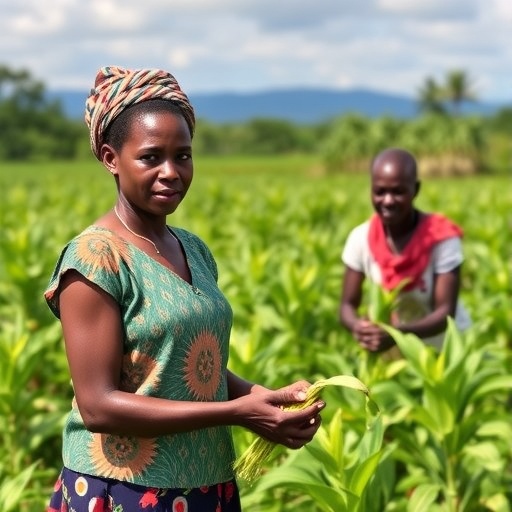Empowering Women in Uganda’s Agro-Value Chain: A Study of Transformative Change
Women in Uganda are experiencing a significant transformation in their socio-economic status, particularly through their active engagement in the agro-value chain. This phenomenon, which is reshaping the economic landscape, underscores the importance of women’s empowerment in agricultural practices and the wider economy. A recent study conducted by Kwiringira, J.N., Amuge, G.E., and Okimait, D., sheds light on the pathways that lead to empowerment for Ugandan women involved in agriculture. The findings not only illustrate the significant changes resulting from women’s economic empowerment but also highlight the broader implications for societal development.
At the heart of this study is the recognition that empowering women within the agro-value chain has a multiplying effect on community development. As women gain access to resources, training, and networks, they become more productive, which contributes to local food security and economic stability. The researchers emphasize that when women are involved in agricultural production, they tend to reinvest a considerable portion of their income into their families, thus fostering better health and education for future generations. This cyclical benefit accentuates the necessity to focus on women’s roles in agriculture as catalysts for development.
The most significant changes identified in the study relate to access to resources. Women who have participated in various empowerment programs have reported enhanced access to land, financial services, and agricultural inputs. These resources are crucial for optimizing production and improving the quality of agricultural outputs. Additionally, increased access to training and skill development has enabled many women to adopt more sustainable farming practices, thus ensuring both their economic viability and environmental sustainability. This shift highlights the intersection of gender equity and ecological health, a theme that resonates with global sustainability goals.
Moreover, the research outlines the pathways through which these transformations occur. One prominent pathway is through cooperative formation, where women organize themselves into groups to pool resources and share knowledge. Collectively, they can access better markets, negotiate fair prices, and gain bargaining power. This solidarity not only boosts their economic status but also fosters a sense of community and mutual support among women, ultimately facilitating a cultural shift towards recognizing women’s contributions within society.
The study also reveals the role of technology in enhancing women’s empowerment in the agro-value chain. With the growing prevalence of mobile technology and digital platforms, women are increasingly able to access information about markets, prices, and agricultural practices. This access allows them to make informed decisions that can enhance their productivity and profitability. Furthermore, the use of technology has improved communication and collaboration among women, which is essential for sharing best practices and fostering innovation within the sector.
Importantly, the researchers recognize the challenges that persist despite these positive changes. Issues such as gender-based violence, cultural norms, and inadequate support systems still hinder many women from fully realizing their potential in agricultural enterprises. Thus, it is crucial to address these challenges through integrated approaches that involve both men and women, ensuring that the entire community benefits from women’s economic empowerment.
In addition to addressing challenges, the study stresses the importance of policy frameworks that support women’s empowerment in agriculture. Policymakers have a pivotal role in creating an enabling environment that fosters equality and facilitates access to resources. By prioritizing gender-sensitive policies, governments can dramatically alter the landscape for women in agriculture, providing them with the tools necessary to thrive.
Furthermore, the implications of women’s empowerment extend beyond individual women or families; they have the potential to transform entire communities and economies. When women are empowered, they contribute to greater economic growth, enhance resilience to climate change, and promote overall societal well-being. This ripple effect underscores the critical importance of investing in women’s roles in agriculture as a strategic move towards sustainable development.
As the research concludes, the authors call for a multi-stakeholder approach to support women in the agro-value chain. This involves collaboration between governments, NGOs, private sector players, and the women themselves to create comprehensive strategies that address the various dimensions of empowerment. Such partnerships are vital for harnessing the collective expertise and resources necessary for sustainable change.
Overall, the insights provided by Kwiringira and colleagues profoundly demonstrate that enhancing women’s economic empowerment in Uganda’s agro-value chain is not merely a moral imperative but an essential strategy for achieving sustainable development. The convergence of economic growth, gender equity, and environmental stewardship presents a promising vision for the future of Uganda and can serve as a blueprint for similar initiatives in other regions.
In summary, the study highlights the significant progress made in empowering Ugandan women through their involvement in agriculture. However, sustained efforts and comprehensive strategies are required to ensure these changes not only persist but thrive. The empowerment of women within the agro-value chain stands as a beacon of potential, illuminating the path toward a more equitable and prosperous future.
Subject of Research: Women’s Economic Empowerment in the Agro-Value Chain
Article Title: Most significant changes from women’s economic empowerment and pathways from Ugandan women in the agro-value chain
Article References:
Kwiringira, J.N., Amuge, G.E., Okimait, D. et al. Most significant changes from women’s economic empowerment and pathways from Ugandan women in the agro-value chain.
Discov glob soc 3, 145 (2025). https://doi.org/10.1007/s44282-025-00301-6
Image Credits: AI Generated
DOI: https://doi.org/10.1007/s44282-025-00301-6
Keywords: Women’s empowerment, agro-value chain, Uganda, economic development, sustainability, gender equality, cooperative formation, technology in agriculture.




